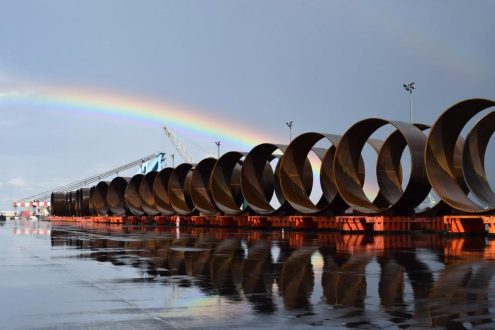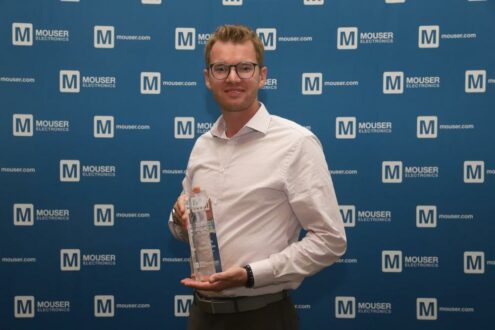Metro sees rapid sales recovery in Q3 2019/20, reported EPS grows to €1.41 (PY €0.32)
[[Previous year’s adjustment to continuing operations (without Real and METRO China) and due to full retrospective application of IFRS 16 (leasing agreements)]
– Like-for-like sales decrease by -17.5% in Q3 2019/20 due to the effects of the COVID-19 pandemic
– Clearly positive trend from April (-26.4%) to May (-19.4%) and to June (-6.7%)
– Trader and SCO sales grow significantly above previous year, HoReCa sales recover quickly and above-market level during the quarter
– Sustainable turnaround in Russia
– EBITDA adjusted (excl. transformation costs and earnings contributions from real estate transactions) in Q3 2019/20 at €175 million (Q3 2018/19: €373 million)
– Profit or loss for the period from continuing operations attributable to METRO shareholders in Q3 2019/20 at €-140 million (Q3 2018/19: €90 million). Earnings per share from continuing operations at €-0.38 (Q3 2018/19: €0.25).
– Reported profit or loss for the period attributable to METRO shareholders in Q3 2019/20 at €512 million (Q3 2018/19: €115 million). Reported earnings per share at €1.41 (Q3 2018/19: €0.32).
– Net proceeds of ~€1.9 billion and corresponding debt relief from the successful sale of the majority stake in METRO China and the sale of the hypermarket business
– Transaction proceeds and stable financial performance strengthen our balance sheet and lay the foundation for dividend continuity
In Q3 2019/20 METRO AG’s like-for-like sales declined by -17.5% compared to the previous year. At the same time, governmental restrictions in the context of the COVID-19 pandemic had a noticeable impact on METRO’s business development, especially in the first half of Q3 2019/20. In April, due to the complete lockdown of the gastronomy sector, like-for-like sales decreased to around 75% of the previous year’s sales. With an initial easing of measures in May and a conversion of gastronomy to take-away and delivery offers, the reduction in sales in May amounted to 80% compared to the previous year. Due to the restart of the gastronomy sector, like-for-like sales in June were again at 95% of previous year’s sales. With the start of the resurgent tourism business, at the beginning of Q4 METRO’s total sales came back to previous year’s level. The rapid recovery is primarily the result of the flexible channel offering with delivery and stationary business to METRO customers as well as the close cooperation with customers to overcome the crisis. According to market estimates1, METRO outperformed the market in Germany and in some countries in Western Europe. In addition, the Trader and SCO customers are again continuously growing above the previous year’s level and thus also contributing to the positive development. In local currency, sales in Q3 2019/20 decreased by -17.4%. Reported sales decreased by -19.8% to €5.6 billion. In 9M 2019/20, like-for-like sales declined only by -5.0% due to accelerated sales growth before the pandemic. In local currency, sales in 9M 2019/20 also declined by -5.0%. Reported sales decreased by -5.5% to €19.1 billion.
Adjusted EBITDA excl. transformation costs and earnings contributions from real estate transactions in Q3 2019/20 was €175 million (Q3 2018/19: €373 million). The decline in EBITDA is almost entirely due to the drop in sales in connection with government restrictions and a change in consumer behaviour in response to the COVID 19 pandemic. This was offset by cost savings from the efficiency programme in the headquarters and licence earnings from the partnership with Wumei in China, among other things. In Q3 2019/20 transformation costs amounted to €1 million (Q3 2018/19: €0 million). Earnings contributions from real estate transactions amounted to €2 million (Q3 2018/19: €32 million). Taking transformation costs and lower earnings contributions from real estate transactions into account, EBITDA reached €176 million (Q3 2018/19: €404 million).
In 9M 2019/20 adjusted EBITDA excl. transformation costs and earnings contributions from real estate transactions reached €834 million (9M 2018/19: €1,033 million). Government restrictions in the context of the COVID-19 pandemic had a negative impact on the majority of segments. This was offset by cost savings achieved through the efficiency programme in the headquarters, improved earnings in logistics, licence earnings from the partnership with Wumei and a stable development both in Germany and Russia, among other things. In 9M 2019/20 transformation costs amounted to €46 million (9M 2018/19: €0 million). These transformation costs were only incurred in the segment Others and relate in particular to the efficiency measures in the headquarters. Earnings contributions from real estate transactions amounted to €3 million (9M 2018/19: €66 million). Reported EBITDA reached €791 million (9M 2018/19: €1,099 million).
In Q3 2019/20, METRO benefited from the diversity of its business model. Sales with Trader and SCO developed positively at a growth level significantly above the previous year, with SCO sales in the low doubledigit figures. SCO customers appreciate the high product quality, product availability and safety. The independent retailers profit from the franchise programmes and METRO’s e-commerce offer. Among HoReCa customers, the preference for the stationary business had a distinctly positive effect during the phase of easing government restrictions. HoReCa customers increasingly visited METRO stores, which led to a disproportionate shift in favour of the stationary business.
Olaf Koch, CEO of METRO AG, explains the business development: “METRO has so far coped well with the corona crisis despite significant sales declines in the lockdown phase and is emerging from it stronger. At the beginning of Q4 like-for-like sales are back on previous year’s level. Contributing factors included the very pleasing business development in Russia, the channel flexibility with stationary and delivery business, our contribution to the successful restart of the gastronomy sector and the numerous measures taken to strengthen independent retailers. This is paying off now. Sales growth with Trader and SCO is above pre-crisislevel, sales with HoReCa are above market level. METRO has thus marked itself out from the competition and at the same time created the conditions for dividend continuity through the successfully completed transactions of METRO China and Real with a net cash inflow of €1.9 billion and corresponding debt reduction.”
Please find further information in the attachement.
METRO is a leading international wholesale company with food and non-food assortments that specialises on serving the needs of hotels, restaurants and caterers (HoReCa) as well as independent traders. Around the world, METRO has some 16 million customers who can choose whether to shop in one of the large-format stores, order online and collect their purchases at the store or have them delivered. METRO in addition also supports the competitiveness of entrepreneurs and own businesses with digital solutions and thereby contributes to cultural diversity in retail and hospitality. Sustainability is a key pillar of METRO’s business. METRO has been the European sector leader in the Dow Jones Sustainability Index. The company operates in 34 countries and employs more than 100,000 people worldwide. In financial year 2018/19, METRO generated sales of €27.1 billion. For more information, please visit www.metroag.de
METRO AG
Schlüterstraße 1
40235 Düsseldorf
Telefon: +49 (211) 6886-0
Telefax: +49 (211) 688620-00
http://www.metrogroup.de
![]()




